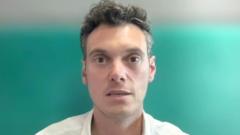The UK’s Jet Zero strategy aims to make air travel carbon neutral by 2050, with ambitious goals to reduce aviation’s environmental impact. Both Conservative and Labour governments have pledged to reach net zero emissions, but the challenge is immense. A single passenger flying economy from London to New York generates 309kg of carbon dioxide, which would require about 10 mature trees a year to absorb.
The strategy focuses on several key approaches to reducing aviation emissions. Technological innovations have been gradually improving aircraft efficiency, such as “sharklets” – upturned wing tips that reduce drag and save 4% fuel per trip. Rolls-Royce is developing the “UltraFan” engine, which could reduce fuel consumption by 10%, though it won’t be commercially available until the 2030s.
Sustainable Aviation Fuel (SAF) represents another potential solution. The British government mandates that 22% of jet fuel must come from sustainable sources by 2040. However, current SAF production faces challenges, including the environmental cost of shipping cooking oil from Asia and the significant electricity required for manufacturing.
Airspace modernization offers another emissions reduction strategy. By using satellite technology to create more direct flight paths, airlines could potentially cut emissions by up to 15% by 2050. This involves redesigning flight routes that have remained largely unchanged for decades.
Electric and hydrogen-powered aircraft are also being explored. Inventor Stephen Fitzpatrick’s VX4, an electric aircraft powered by lithium-ion batteries, shows promise for short-range flights. Companies like ZeroAvia and Airbus are developing hydrogen-powered propeller planes, though these are currently limited in speed and range.
The government’s estimates suggest these approaches will only reduce aviation emissions by about a third. To bridge the gap, the Jet Zero strategy includes carbon offsetting and pricing schemes that will likely increase ticket costs.
Experts are divided on the strategy’s feasibility and cost. Former aviation minister Anthony Browne suggested ticket price increases would be “marginal,” while Oxford University professor Sir Dieter Helm argues that costs will definitely be higher. Duncan McCourt from Sustainable Aviation remains optimistic, believing the changes will only add a few pounds to ticket prices.
A significant challenge is the projected increase in flight numbers. The UK is expected to see an additional 150 million flights annually, making emissions reduction even more difficult.
Sir Dieter Helm remains skeptical about the government’s commitment to achieving the Jet Zero target, suggesting the strategy might be more about appearance than actual implementation.
The article highlights the complexity of decarbonizing aviation, demonstrating that while promising technologies exist, achieving truly sustainable air travel by 2050 will require substantial technological innovation, significant investment, and potentially fundamental changes to how we approach air transportation.




